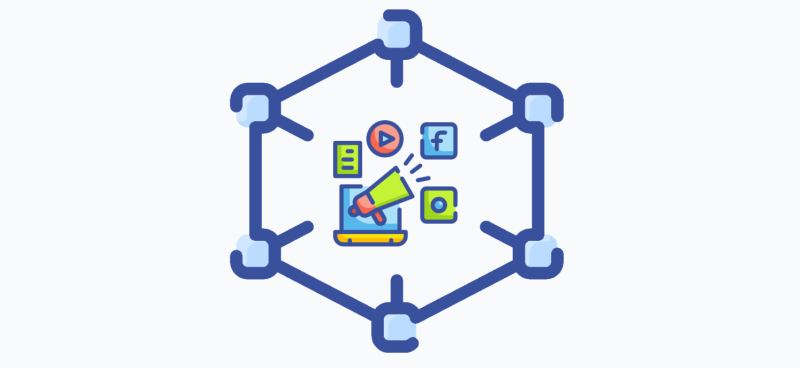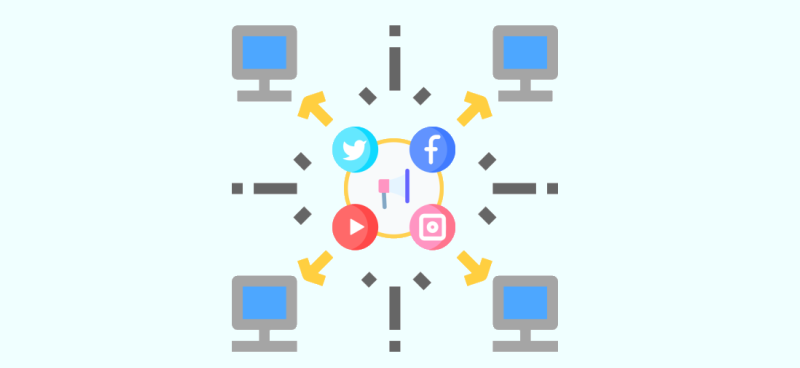
Decentralized social media networks are like regular social media networks, but instead of having one big company in charge, they are run by a community of people. Think of it like a neighbourhood club or a group of friends running a social media platform together, rather than a big business.
Decentralized social media networks allow users to have more control over their information and privacy, as there is no central company that controls the flow of data.
Additionally, because the data is spread out across many computers instead of being stored in one central location, it is harder for the information to be censored or tampered with. It’s like having a secret diary that you keep in many different places, rather than just one, making it more difficult for someone to steal or read it.
Table of contents
What Is Decentralization in Social Media?
When it comes to social media, decentralization means creating a platform where the control and ownership is spread out among many individuals or groups, rather than being controlled by a single company or organization.
Imagine a big house where everyone goes to share their thoughts, ideas and experiences with each other. This big house is controlled by a single person or a group of people, and they decide who can come in and what can be shared. Decentralization of social media would be like giving a key to every individual so that they can have their own house and share their thoughts, ideas and experiences with whoever they want to. This way, many different houses will be there, and everyone will have their own house to share their thoughts and experiences.
This way, users will have more control over their data and their online identity, and there would be more diversity of voices and perspectives represented on the platform. It is important to note that creating a decentralized social media platform would require changes in regulations and laws, and it would require a new way of thinking about online identity and online communities.
Decentralized social networks operate on a global network of thousands of nodes that work together in a peer-to-peer fashion. This means that even if some nodes fail, the network will continue to operate without interruption, making these applications resistant to failures and outages. Additionally, by using decentralized storage systems like IPFS, social networks built on Ethereum can protect user information from being exploited or misused. This also means that personal information will not be sold to advertisers, and hackers will not be able to steal confidential details.
How Do You Make Social Media Decentralized?
Decentralizing social media involves creating a platform where the control and ownership is spread out among many individuals or groups, rather than being controlled by a single company or organization.
One way to do this would be to use a technology called blockchain. Blockchain is a way of storing data on a network of computers, rather than on a single server. This means that no single person or organization would have control over the data or the platform.
Another way to decentralize social media would be to create a platform where users can own their own data and control their own digital identity. This could be done by allowing users to create their own profiles, and allowing them to control who has access to their data.

How Does Decentralized Social Media Work?
Decentralized social media is a system where multiple individuals or groups have control and ownership over the platform, instead of it being controlled by a single organization. It is made possible by using a technology called blockchain, which allows for the creation of decentralized applications (dApps). Smart contracts are used as the backbone for these dApps, which dictate how the platform functions and operates. This ensures that the platform is transparent and fair for all users, as the rules are set in the contract code.
Traditional social media platforms use a centralized system where all the user information, program code, and other forms of data are stored in one central location, often referred to as a database. This can lead to problems such as single points of failure and vulnerabilities. For example, in the past there have been instances where the servers of popular social media platforms like Twitter and Facebook have gone down, cutting users off from the platform for hours or even days. This kind of outage can be caused by a variety of issues, including technical problems, cyber attacks, or even natural disasters.
Decentralized Social Media Platforms that are Currently Available
As you may recall, decentralized social media platforms have several benefits. Let’s take a moment to explore some examples of decentralized options compared to well-known centralized platforms:
| Social Media Platform | Decentralized Alternative |
|---|---|
| Minds, Diaspora, MeWe | |
| ? YouTube | LBRY, D.Tube, PeerTube |
| KARMA | |
| Aether | |
| ? Other Platforms | Steemit, Sphinx, Twetch |
What’s the Future of Decentralized Social Media?
In 2023, decentralized social media is expected to continue growing in popularity and usage. The increasing concerns over data privacy, security and censorship on centralized social media platforms will drive more users towards decentralized alternatives. Decentralized social media platforms are inherently more resistant to censorship and provide users with more control over their data, which will make them more appealing to users. Additionally, advancements in technology such as blockchain and InterPlanetary File System (IPFS) will make decentralized social media more accessible and user-friendly, further increasing their adoption.
Another trend in the future of decentralized social media is the rise of decentralized finance (DeFi) applications that are built on blockchain platforms and Non-Fungible Tokens (NFTs). These applications will allow users to earn money through various means such as staking, liquidity provision, and yield farming. This will create new opportunities for creators and users to monetize their content and activities on decentralized social media platforms. This will also lead to the integration of various DeFi services on these platforms, such as lending and borrowing, payments, and trading, making them more useful and versatile for users.
Conclusion
In conclusion, the future of decentralized social media looks promising, with an increasing number of users turning to these platforms for more privacy, security and control over their data. As technology continues to advance and more decentralized applications are developed, we can expect to see more innovation and growth in this space in 2023 and beyond.
